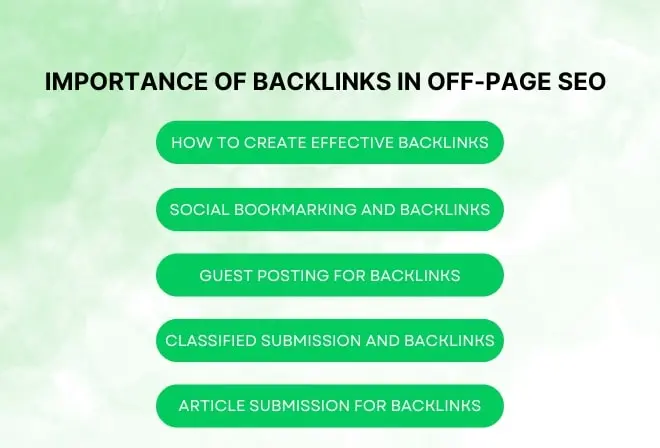Backlinks play a critical role in off-page SEO and are essential for improving a website’s search engine rankings. These inbound links from other websites serve as votes of confidence in your content, signaling to search engines that your site is reputable and valuable.
1. Introduction to Off-Page SEO
Off-page SEO encompasses all activities that happen outside your website but influence its ranking in search engine results pages (SERPs). Unlike on-page SEO, which focuses on optimizing your website’s content and structure, off-page SEO involves external factors such as backlinks, social media engagement, and domain authority. Among these, backlinks are particularly influential in determining how search engines perceive the value and relevance of your content.
2. What are Backlinks?
Backlinks, also known as inbound links, are hyperlinks from one website to another. These links indicate that other websites find your content valuable enough to reference. Backlinks come in two forms:
- Dofollow backlinks, which pass authority from one site to another.
- Nofollow backlinks, which do not pass authority but still contribute to site traffic and credibility.
Backlinks are essential because they help search engines determine the trustworthiness and relevance of your site in a particular niche.
3. The Importance of Backlinks in Off-Page SEO
The importance of backlinks cannot be overstated when it comes to off-page SEO. Backlinks are a primary ranking factor for search engines like Google. When your website receives backlinks from high-authority sites, it signals to search engines that your content is valuable and trustworthy. This increases your website’s chances of ranking higher in SERPs.
Moreover, backlinks contribute to the growth of Domain Authority (DA) and Page Authority (PA), both of which are metrics that measure the strength and credibility of your website. The more quality backlinks you earn, the better your site’s authority and ranking potential.
4. How Search Engines Evaluate Backlinks
Search engines use a variety of factors to evaluate the quality and relevance of backlinks. Some of the key criteria include:
- Trustworthiness: Backlinks from well-established and authoritative sites carry more weight.
- Relevance: Links from sites within your niche are more valuable than unrelated ones.
- Anchor Text: The clickable text in a hyperlink helps search engines understand the context of the linked content.
- Link Placement: Links embedded within the main body of content are more valuable than those in sidebars or footers.
5. Natural vs. Unnatural Backlinks
Search engines prefer natural backlinks, which are earned organically when other websites link to your content without being prompted. On the other hand, unnatural backlinks are often purchased or obtained through manipulative tactics, which can lead to penalties.
Avoiding black hat SEO techniques such as link farms or spammy link exchanges is crucial to maintaining a healthy backlink profile.
6. Techniques to Build High-Quality Backlinks
Here are some effective strategies to earn high-quality backlinks:
- Create valuable content: High-quality, informative, or entertaining content attracts organic backlinks.
- Infographics: Visual content is highly shareable and often earns backlinks.
- Guest Posts: Writing articles for other websites is a reliable way to build backlinks.
7. Social Bookmarking and Backlinks
Social bookmarking involves submitting your content to social bookmarking websites where users can save and share your links. These platforms not only drive traffic but also help in acquiring backlinks.
Popular social bookmarking sites include Reddit, Pinterest, and StumbleUpon.
8. Guest Posting for Backlinks
Guest posting involves writing articles for other blogs or websites within your industry. In exchange for your valuable content, the host site will typically allow you to include a backlink to your website, helping to increase your online visibility and authority.
To find guest posting opportunities, you can search for blogs in your niche that accept guest submissions and pitch unique, valuable content ideas.
9. Classified Submission and Backlinks
Classified submission refers to posting ads and business listings on classified ad websites. These submissions can include backlinks to your website, driving both traffic and potential authority.
Popular classified ad platforms include Craigslist, OLX, and Locanto.
10. Article Submission for Backlinks
Article submission involves publishing articles on external websites, often directories, to gain exposure and backlinks. While this method requires you to write unique, high-quality content, it can yield significant SEO benefits when done correctly.
11. Web 2.0 Submission and Its Role in Backlinking
Web 2.0 submission refers to the creation of content on third-party platforms like WordPress, Tumblr, and Medium. These platforms allow you to build a network of backlinks through the creation of blogs or articles on their sites.
12. Monitoring and Managing Backlinks
It’s important to keep track of your backlinks to ensure they are working in your favor. Tools like Ahrefs, SEMrush, and Moz can help you monitor your backlink profile. If you discover toxic backlinks, you can use Google’s Disavow Tool to prevent them from harming your site’s ranking.
13. The Future of Backlinks in SEO
As search engines evolve, so does the role of backlinks in SEO. With updates to Google’s algorithm focusing more on content quality and user experience, backlinks remain essential but need to be obtained organically and ethically.
14. Common Backlinking Mistakes to Avoid
Some common mistakes to avoid include:
- Using spammy tactics to build links.
- Over-optimizing anchor text with exact-match keywords.
- Focusing on quantity over quality.
15. Conclusion
Backlinks remain a cornerstone of off-page SEO, helping to boost your website’s credibility, authority, and search engine rankings. However, it’s essential to build these links ethically, focusing on quality over quantity and avoiding black hat techniques.
FAQs
- What are backlinks in SEO?
- Backlinks are links from one website to another and are crucial for SEO.
- How do backlinks affect SEO?
- Backlinks signal to search engines that your content is trustworthy and relevant, improving your rankings.
- What is the difference between dofollow and nofollow backlinks?
- Dofollow backlinks pass authority to your site, while nofollow links do not.
- Can social bookmarking help in SEO?
- Yes, social bookmarking helps build backlinks and drive traffic to your site.
- Is guest posting still effective for backlinking?
- Yes, guest posting is a great way to earn high-quality backlinks and grow your online presence.
- What are the risks of using black hat SEO techniques?
- Black hat techniques, such as buying links, can result in search engine penalties.

